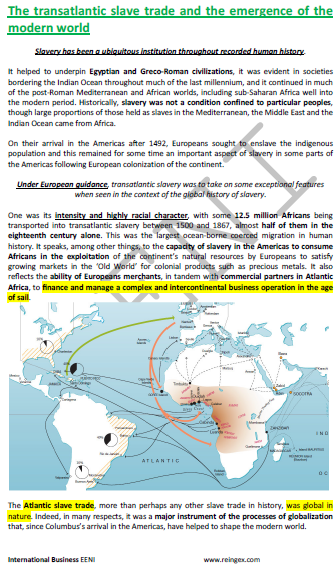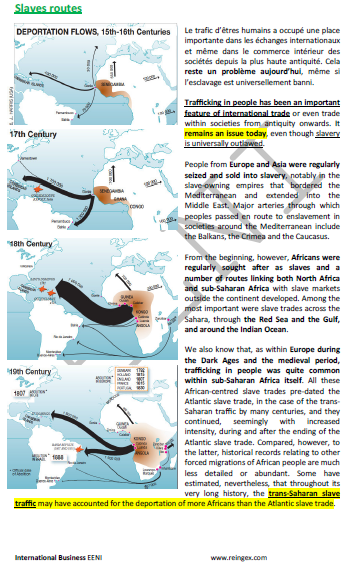Transatlantic Slave Trade

Transatlantic Slave Trade (Africa-America-Europe)
According to the UNESCO, near 30 million Africans (men, women, and children) were stolen from Africa during the 400 years that lasted the Transatlantic Slave Trade.

The Subject “Transatlantic Slave Trade (Europe-Africa-America)” belongs to the following Online Programs taught by EENI Global Business School:
Doctorate in African Business, Ethics, Religion & Business.
Languages:  or
or  Traite Transatlantique
Traite Transatlantique  Tráfico Transatlântico
Tráfico Transatlântico  Trata Transatlantica.
Trata Transatlantica.

Consequences of the Transatlantic Slave Trade for Africa: deceleration of the African population growth and his economic development.
Transatlantic Slave Trade (Africa)

During 400 years, more than 30 millions of men, women and children were victims of the tragic Transatlantic Slave Trade, one of the most sinister episodes of the History of humanity.
- Mortality of the Transatlantic Slave Trade (estimates): for every African who came to the Caribbean or the Americas, died four or five
- 200 million Americans (African Diaspora) are considered that has an African origin
- Legal basis of the Slave Trade and Slavery: The Black code
- The Transatlantic Slave Trade is often regarded as the first system of Globalization (Africa-America-Europe)
“There was a buffalo soldier in the heart of America, stolen from Africa, brought to America.
Fighting on arrival, fighting for survival.
If you know your history, then you would know where you are coming from” Bob Marley -
Buffalo soldier
Sample:
Continents and countries implicate in the Transatlantic Slave Trade:
Victims: Africans of Sub-Saharan Africa (*).
Current African Countries affected by the Slave Trade (*): Benin, Ivory Coast, the Gambia, Ghana, Guinea-Conakry, Guinea-Bissau, Liberia, Nigeria, Senegal, Sierra Leone, Togo, Burkina Faso, Niger, Mali, Cape Verde, South Africa, Namibia, Botswana, Lesotho, Eswatini, Zambia, Zimbabwe, Djibouti, Eritrea, Kenya, Mozambique, Tanzania, Sudan, Burundi, Ethiopia, Malawi, Rwanda, South Sudan, Uganda, Angola, Cameroon, Gabon, Equatorial Guinea, the Republic of the Congo, the DR Congo, the Central African Republic, Chad, and São Tomé and Príncipe.
African Slaves Destinations (African Diaspora):
- The Islands of the Indian Ocean (four million): Madagascar, Mauritius, the Seychelles, and the Comoros
- America
- The U.S., Canada, and Mexico
- Central America: Costa Rica, Honduras, Panama, Belize, El Salvador, Guatemala, and Nicaragua
- The Caribbean: Antigua and Barbuda, the Bahamas, Bermuda, Barbados, Dominica, Grenada, Guyana, Jamaica, Montserrat, Saint Kitts and Nevis, Saint Lucia, Saint Vincent and the Grenadines, Trinidad and Tobago, Haiti, Anguilla, the Turks and Caicos Islands, the British Virgin Islands, the Dominican Republic, Cuba, and the Cayman Islands
- The Andean Countries: Bolivia, Colombia, Ecuador, Peru, Venezuela, Suriname, the French Guyana, and Belize
- South America: Argentina, Brazil, Chile, Uruguay, and Paraguay
2- Countries and continents traffickers:
- Africa (*): Egypt, Algeria, Morocco, Tunisia, Mauritania, and Libya
- Europe: Spain, Portugal, the UK, France, the Netherlands, Denmark, Sweden, and Prussia
- America: The U.S. and Brazil
- The Arab Countries: Saudi Arabia, Yemen, Oman, Qatar, the Emirates, and Kuwait
- Turkey
(*) In almost all the African Countries has been Africans who participated in the slave trade.
The Volume V (Africa from 16th to 18th Century) of the History of Africa analyze the Slave Trade.
Harriet Tubman and Frederick Douglass (Slaves).
(c) EENI Global Business School (1995-2024)
We do not use cookies
Top of this page



